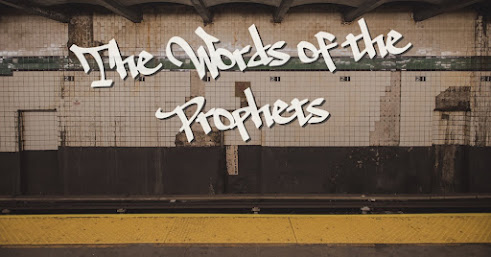The Words Of The Prophets - Week 4: Leaders Who Scatter vs. Leaders Who Gather
Today we're concluding the sermon series entitled "The Words Of The Prophets."
In the weeks leading up to Advent, we've been listening to the voices of the Old Testament prophets from the Lectionary readings as they prepare for the coming of the Messiah.
The inspiration for this series is a line from the classic song "The Sound of Silence" by Simon & Garfunkel. The line goes like this: The words of the prophets are written on the subway walls..."
Biblical prophets aren’t predictors of the future; they hope to shape it. They used their words to either project a hopeful future or one full of hardship---all based on what was happening at the moment.
And the words of the prophets can come to us from some unlikely places at times.
We just have to have our eyes open, our ears ready to hear, and our hearts ready to be transformed.
Prophetic imagination helps us see beyond our reality and God's reality. We get glimpses of the coming Kingdom of God to see the world the way it ought to be, and we also get a vision of a Messiah.
Today we’ll learn from a prophet who was given a vision of the kind of leader that would change the world—forever…
1 The words of Jeremiah son of Hilkiah, one of the priests at Anathoth in the territory of Benjamin. 2 The word of the Lord came to him in the thirteenth year of the reign of Josiah son of Amon king of Judah, 3 and through the reign of Jehoiakim son of Josiah king of Judah, down to the fifth month of the eleventh year of Zedekiah son of Josiah king of Judah, when the people of Jerusalem went into exile.
Josiah was a good king by all accounts. He did what was right, for the most part. He enacted laws that brought the people of Judah back into a closer relationship with God, and he governed justly and rightly.
But after he was killed in battle against the Egyptian empire in the Jezreel Valley, his son Jehoiakim became king, and things went south quickly.
Jehoiakim moved away from the ways that his father had governed and was, by all accounts, a tyrant, who engaged in the worship of other gods, committed incest, was cruel and greedy, and a host of other things.
He died right before the Babylonians took over Judah; his older son only ruled for three months and was executed. Jehoiakim's brother Zedekiah became king, appointed by the Babylonians.
He led for a few years and then entered into an unwise alliance with the Egyptians (the ones who had killed his father) until the Babylonians took notice and destroyed everything. Jeremiah railed against this alliance because he knew it would be devastating for the people if the Babylonians retaliated, and he was right.
According to the text, all these kings had something in common: Pride.
They cared more about power and holding on to it than they did about their people or God. Faced with the reality of what their leaders have done to them, and only really having poor examples of leadership in their current situation, the people need a new vision, and Jeremiah gives it to them.
23 “Woe to the shepherds who are destroying and scattering the sheep of my pasture!” declares the Lord. 2 Therefore this is what the Lord, the God of Israel, says to the shepherds who tend my people: “Because you have scattered my flock and driven them away and have not bestowed care on them, I will bestow punishment on you for the evil you have done,” declares the Lord. 3 “I myself will gather the remnant of my flock out of all the countries where I have driven them and will bring them back to their pasture, where they will be fruitful and increase in number. 4 I will place shepherds over them who will tend them, and they will no longer be afraid or terrified, nor will any be missing,” declares the Lord.
5 “The days are coming,” declares the Lord,
“when I will raise up for David[a] a righteous Branch,
a King who will reign wisely
and do what is just and right in the land.
6 In his days Judah will be saved
and Israel will live in safety.
This is the name by which he will be called:
The Lord Our Righteous Savior.
The words of God to Jeremiah paint a different portrait of a leader. This leader does not scatter, does not instill fear, or act out of selfish ambition. It's a leader who does what is right and just, who gathers the people like a good shepherd.
The people of God in Jeremiah's day needed this vision. They needed to know that such a leader existed, and it was God's desire they have such a leader.
This passage precedes Advent because we know what a Good Shepherd, a just King looks like—humble, grace-filled, servant-minded, willing to lay down his life for his sheep.




Comments
Post a Comment
Thanks for leaving a comment! If you comment Anonymously, your comment will summarily be deleted.